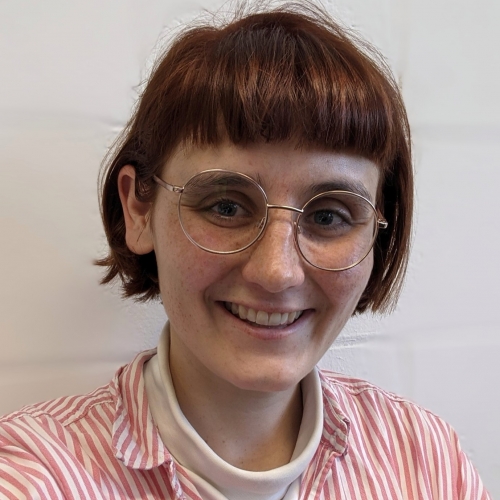
Harriet Mason
Monash University
I am a third-year PhD student at Monash University with a research focus on uncertainty visualisation. My work is in partnership with the Australian Energy Market Operator (AEMO) as effective communication of uncertainty is useful in all areas that require complicated decision-making or increased transparency. When I’m not researching uncertainty, I’m usually complaining about minor life grievances on my blog, playing soccer, or crocheting matching outfits for myself and my dog.
1. Give me a quick overview of the type of mathematics you are studying, and/or the aims of your research and its potential applications/outcomes (how you would explain your work and studies to friends who don’t study maths?)
My research is in uncertainty visualisation. When we communicate an idea to another person we will occasionally do something called “hedging” where we add specific words to express uncertainty in a sentence. For example, “I might go to the store” is a hedged alternative of “I will go to the store”. When we communicate statistics in a visualisation, we very rarely communicate the underlying uncertainty (i.e. hedge) which can lead us to imply more certainty about our results than is warranted by the data. My research looks at how we can design and evaluate plots that effectively “hedge” their message.
2. How did you get into the mathematical sciences? Was there someone or something that inspired you to this field?
I always enjoyed math at school, but I did economics at university because I enjoyed the “rational-agent” thought experiment that is the backbone of economics. However as I moved through university the courses I enjoyed (and therefore did more of) moved from economics, to econometrics, to applied statistics, and eventually to some pure math classes in my final years. The short version is that I ended up in math just by doing more of the things I enjoyed.
3. Winter School is designed to give students a deeper understanding of their area of research and expose them to others working in different fields/industries. Tell me about your Winter School experience. What was the most valuable part of the program for you?
I actually got a lot out of the participant talks, even though I wasn’t initially expecting to. I have been struggling with communicating my research recently given my supervisors are too close to my topic (and have no difficulty understanding it) and the other people in my life are too far from my topic (and can’t understand the basic statistics concepts I try to explain). Having the opportunity to explain my research to a general audience with basic statistics knowledge was invaluable. The feedback on my research from others (and their similar experiences in my field), while also discussing and learning about their research was a big highlight for me.
4. What was your main take away/s from AMSI Winter School? Something you learnt? A connection you made? Do you have new ideas for your work/research or see it in a new light?
I have been struggling with the structure of one of my papers for a while now and discussing my work with other participants (as well as learning which aspects are relevant to their field) ended up helping me structure that work. Similarly, several of the classes displayed how other fields are actually using uncertainty which is invaluable information in learning how to communicate it.
5. You received a grant to attend AMSI Winter School. How important was this in terms of your ability to attend, fully participate in the program and meet others studying in similar fields?
Going to conferences and summer/winter schools are important for making advancements in your research. These events allow us to leave the niche bubble of whatever sub-area we are researching and look at work in adjacent fields, where there are often similar problems with different jargon and approaches. Despite the importance of this process, it is hard to justify paying out of pocket for a flights, accommodation, and registration for something that is only adjacent to my research area. Grants decrease the financial burden of this decision, and encourage me to expose myself to researchers and ideas that are outside my usual circle.
6. What advice would you give to someone who is considering applying for Winter School? How would you describe the conference to them?
I actually did tell one of the other students in the PhD to apply for the winter school before I even attended (he didn’t end up applying and regretted it). Since starting research in a more applied field (I mostly just code now), I haven’t had a chance to do proper math for a while and I really missed it. The winter school allowed me to do something I enjoy while also learning about how others use this math in their day to day jobs. The program extras were great, the other participants were friendly and interesting, and the courses were engaging. I had a really fun two weeks.
7. Where do you want the mathematical sciences to take you? Where do you see yourself in five, ten years time?
I always struggle to answer questions like this because I’m quite erratic. I would like to say lecturing in visualisation and statistics, but I could just as likely be making electronics in my garage. I think I ended up working in statistics because it is the tool we use to identify if something is “true” in a fundamentally random world. I often find using that tool to make sense of the chaos that constantly surrounds us to be quite comforting. So even if I did stop working in research or statistics the field would continue to influence my philosophy and approach to life.
8. Any other feedback/comments you would like to provide on the travel grant or AMSI Winter School?
Great! I got to speak to some very interesting undergraduate students who were only able to attend because of the grant money, so please keep doing the program!
